********
THURSDAY – DEC 1 – IS THE DEADLINE FOR THE HIGH CONCEPT SHOWDOWN!
SUBMISSION DETAILS HERE!
********
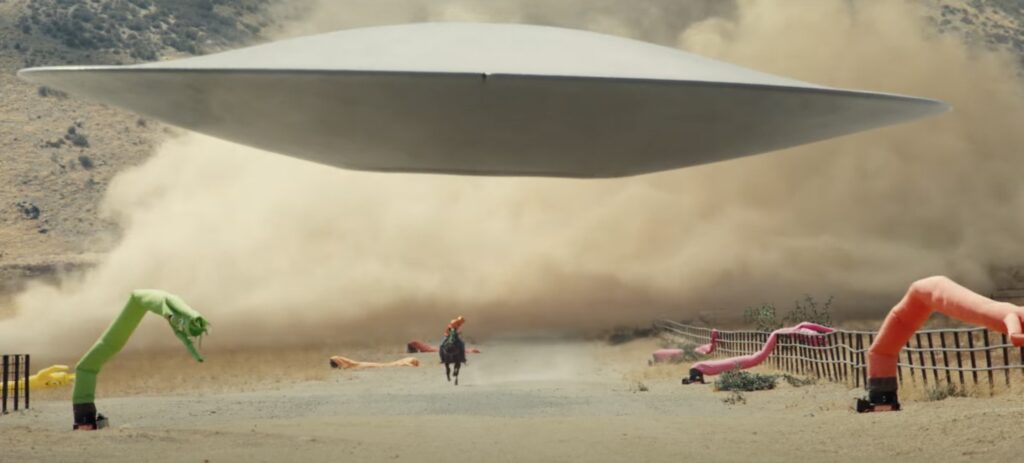
We are just about 24 hours away from the deadline to the High Concept Showdown. This has got me thinking about ‘concept’ and what kind of concepts get people to read scripts. Because, as I like to remind screenwriters, screenwriting is a numbers game. But it’s a numbers game you can win if you play the numbers right.
You simply do whatever you can to increase the number of people who read your script. The number one way to do that outside of having an agent hawking your script all over town, is to come up with a concept that intrigues people enough that they request your script. Too many writers skip this part of the process. Or they put their fingers in their ears and scream “lalalalaalalallalaal” so they don’t have to deal with it. They’d rather write whatever they want and deal with the potential downsides of a weak concept later.
Don’t do that!
A couple of days ago, I read a script from a young writer. Talented guy. Good with dialogue. He made interesting creative choices that gave his script an unpredictable narrative. But I had a talk with him afterwards and I told him, straight up, that promoting this script is going to be difficult (but not impossible) because it doesn’t have an obvious hook. It doesn’t have that juicy concept that gets a lot of people requesting the script. And, as we established, less requests means less of a chance that someone falls in love with it and wants to make it.
As I was explaining this to him, something occurred to me. The idea of a “hook” has changed over the years. By the way, the difference between a concept and a hook is that a concept is the whole enchilada – your whole idea. Whereas a hook is a component of the concept. It’s the part that gets potential readers/viewers excited.
So, if you look at the concept for Cocaine Bear, it would be, “A rural town is upended when a bear gets into a stash of ditched cocaine and becomes a raging predator, determined to take down anyone in its path.” That whole thing is the concept. But the actual hook is just a bear high on cocaine. As soon as the reader sees that, that’s the reason they want to read the script. (by the way, if you have this script, SEND IT TO ME! – carsonreeves1@gmail.com)
So, back in the day, a “hook” was synonymous with “high concept.” Aliens coming to earth to kill us all (Independence Day), a dinosaur theme park (Jurassic Park), a kid who can see dead people (Sixth Sense). There was an expectation that a movie had to feel BIG in order to get that “hook” label. That’s not the case anymore. Our entertainment becomes more fractionated every day. Big movies are relegated to a few key franchises.
This has expanded the definition of hook and it’s important to understand this new definition because, again, a hook is the reason someone wants to open your script. You don’t have to have the most amazing high concept in the world to get someone to request your screenplay. But you certainly need a hook. So let’s look at what that means in 2022.
The most obvious hook-y ideas are high concept ideas. These include the ones I mentioned above. It also includes movies like The Hunger Games, Inception, Don’t Look Up, Finch, and A Quiet Place.
The next class of ‘hook’ is ideas that have that one flashy element you can build a marketing campaign around (a poster and a trailer). The overall story doesn’t have to be some giant concept. You just need that poster-worthy element. Remember, all studios care about is people showing up. So the primary thing they’re concerned about is an idea that GETS PEOPLE TO SHOW UP. So any flashy item that achieves this is enough. Snakes on a Plane. Twister. Cocaine Bear. X. An evil smile (Smile).
The ‘cool idea’ hook is our third type. These are hooks where the overall movie idea itself is fun, interesting, or clever in some way. These movies usually take place in the real world. They don’t have anything fantasy-related or sci-fi related about them. They’ve just got a fun premise that captures your interest. This would be movies like Good Will Hunting, Knives Out, Parasite, Slumdog Millionaire, and The Hurt Locker.
The fourth class of hook is NAME BRAND RECOGNITION. This one has sort of always been around. But it’s increased in value recently. This hook includes anything in the world, past or present, that has some popular recognition. The idea here is that people will show up to watch things they know. This includes biopics (Elvis). It includes well known true stories (a movie about D-Day, for example). House of Gucci, the Dahmer series. I would even place “Once Upon a Time In Hollywood” in this category since it was promoted as a movie that indirectly covered Charles Manson. Lesser known real people or true stories do not fall into this hook category by the way. Bling Ring – no hook. Breaking (John Boyega movie based on a true story) – no hook.
The final and newest class of ‘hook’ is, in a way, a false hook. I’m not convinced that audiences care about this hook. But industry people are obsessed with it and since they’re the ones who can make your movie happen, impressing them is all that matters. And this is the social hook. It’s building your movie around a social issue. She Said. Fruitvale Station. Hidden Figures. Do The Right Thing. The Crying Game. All social hooks.
And yes, there is occasionally crossover with “Social Hooks” and “Name Brand Recognition Hooks.” Crossover is fine. Actually, you can crossover between all five of these with a single idea. But you need at least one hook element to hook a reader.
To that end, what does a movie idea without a hook look like? Unfortunately, we don’t usually see movies without hooks because a major reason the movie was able to get made was that it had a hook. If it doesn’t have one, it doesn’t get made. Sometimes, artsy writer-directors can get non-hook movies made because the movie is greenlit for them, not their idea. A few examples would include Nomadland, Cha-Cha Real Smooth, Columbus, Causeway, and Palmer. Some of you are probably saying, “I’ve never even heard of those movies.” And that may be the best example of why not having a hook is such a problem.
In order to gain a little more clarity over this, here are some movies and their hooks.
She Said – A social hook and a NAME RECOGNITION hook. The movie is about the #metoo movement as well as Harvey Weinstein. A good example of why social hooks are great for studio executives but not so great for audiences.
Nope – Nope definitely has a hook. I would put it in the first category. High concept hook. A group of people on a horse farm believe that an alien entity in the sky is stalking them.
The Whale – This is an interesting one because it does have a unique element to it that could arguably sell a film – a 600 pound man. There’s never been a movie before about a 600 pound man. So it does have some marketing value to it. But this is an example of how having a hook doesn’t necessarily mean it’s a good hook. On the “hook” scale, this is probably between a 6 and a 7 out of 10.
The Social Network – A good example of a NAME BRAND RECOGNITION hook. This was in the early days of Facebook so everyone was curious about Facebook at the time. It marketed itself.
Good Time – This movie doesn’t have a hook. A guy is trying to get his brother back and if he fails, his brother goes to jail. It takes place within 24 hours and speeds things along at an insane clip. But just as an idea? It doesn’t really have a hook. Trying to save someone is such a common setup for a movie that it’s not enough. Which is why, even though it’s a great movie, nobody was interested in checking it out.
Nightcrawler – This is another tough one because the world of late-night blood-chasing indie news vans was certainly an unknown world at the time. So it did have that unique element. But a clue as to whether something has a legit hook or not is how much the marketing campaign leans into the actor playing the role rather than the idea itself. Their whole marketing campaign for this movie was built around Jake Gylenhaal. Not what he was doing.
Ladybird – This one had a negative hook. Almost all coming-of-age scripts do. If you’re trying to break in as a screenwriter, stay away from these. They only get made if you’re the director and someone decides to finance the film. Although writer-directors can get them made.
The Big Short – Yes, this one would fall under BRAND NAME RECOGNITION. The 2008 financial collapse was a big enough event to create marketing recognition. With that said, it wasn’t the highest scoring hook. People eventually went to see it because of the actors. But graded as a hook alone, it was probably a 6 out of 10.
If all of this confuses you, take a step back and internalize what I’m about to say: Just write something you can honestly imagine people paying money to see. Where writers get into trouble is when they only write ideas that interest them, never considering the audience. Those are the ideas that tend to lack hooks.
Will be interesting to see which of your ideas hooked me tomorrow. HIGH CONCEPT SHOWDOWN is 24 HOURS AWAY!!!
Get A Screenplay Consultation from Carson! – Do you want me to look at your script? Tell you how it stacks up against the other 10,000 scripts I’ve read? How it stacks up against all the scripts being sent around town? Is it up to par with those scripts? Is it better than those scripts? Is it not as good? If so, what’s wrong? How can you fix it? This is my area of expertise so if you’ve been thinking about getting a consultation, now is the time to do so! I can give you $50 off if you mention this article. E-mail me at carsonreeves1@gmail.com to get started!
********
THURSDAY IS THE DEADLINE FOR THE HIGH CONCEPT SHOWDOWN!
SUBMISSION DETAILS HERE!
********
Genre: Period Piece/Biopic
Premise: An inside look at the unique relationship between John Wayne and John Ford, who collaborated on one of the greatest movies of all time, THE SEARCHERS.
About: This script made it on the 2019 Black List. Screenwriter MacMillan Hedges sold another script a couple of years ago about a time travel heist that I reviewed. He also worked as a writer’s assistant on the short-lived Robert Kirkman (Walking Dead) show, “Outcast.”
Writer: MacMillan Hedges
Details: 99 pages

I’ve tried to watch The Searchers a couple of times now but I haven’t been able to get past the first 30 minutes. And that’s because the first 30 minutes all take place in one room! Or, at least, that’s what I remember.
The problem with these older movies is they were operating along the same lines as the previous storytelling medium – plays. In plays, there’s only one stage. So you can’t have a bunch of locations. Movies took on that same approach and only, over time, moved away from it.
With that said, it’s still on my list of movies to finish. And if one of you can convince me why it’s worth finishing, I’ll watch it as soon as this week! But, in the meantime, I’m approaching today’s script only as a disconnected piece of storytelling through which I don’t understand all the variables. Take that for what it’s worth!
A young journalist named Peter Bogdanovich sets out to write a book about John Ford and The Searchers, his favorite movie. Ford is notoriously prickly about discussing his movies, especially that one, but he reluctantly gives Bogdanovich permission to write it.
This sends Peter off to get John Wayne’s take on the production. Wayne is doing something insane, which is self-financing a movie about the Alamo in which he’s both directing and starring. Once there, we begin cutting back and forth between Wayne and Ford’s recollection of their dysfunctional creative partnership.
What we mostly learn is that John Ford is a really really really really really bad person. He’s manipulative, mean, aggressive, a bully. Apparently, John Ford loved dressing down a crew member in front of everyone more than he did actually framing a shot. Mostly, Ford seems bored by his profession. I suppose it’s so mundane to him that he doesn’t see his work the magical way everyone else does.
As the characters recall the lead-up to The Searchers, we learn that Wayne was a nobody before Ford found him and Ford loved having that power. He loved that Wayne did badly whenever he didn’t do a movie with Ford. Ford would toy with him whenever Wayne’s career was in the toilet, dangling starring roles in front of him, creating doubt, only to, at the last second, offer him the role.
This dysfunctional whatever you’d call it relationship plays out through their entire careers. Even, at the end, Wayne struggles to reconcile who Ford was to him. He also must decide if protecting Ford’s biggest secret is worth what it costs him.
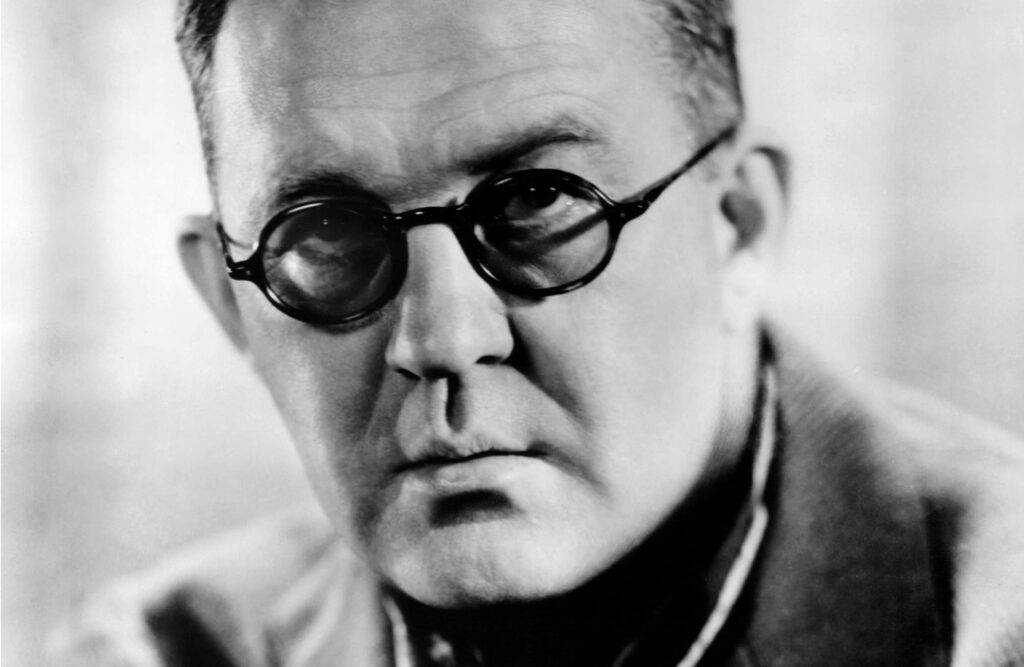 John Ford
John Ford
I think I learned something new today.
I like two-hander biopics!
It spices up a genre that is so vanilla, it borders on tasteless.
One of my big problems with biopics is they’re annoyingly predictable. But once you introduce the two-hander, that goes away. The very fact that you’re cutting back and forth between two people provides the script with a natural unpredictability.
The two-hander also infuses the biopic with conflict. At least if you do it right. Since, as a two-hander, you want to look for two characters who are at odds with each other rather than content. If you pick the right pair, it’s like a “versus” battle.
With that said, John Ford seems to be his own personal tornado of conflict. I didn’t know anything about the guy but he seems like a grade-A a$$hole to the millionth degree. Holy schnikees was he a jerk. I’m not one who supports cancel culture but I would not have minded seeing Ford go through the online mob wringer. This guy wouldn’t have made it past his first movie if he’d directed it today!
Granted, that’s what makes the script work. Ford is a total jerkface and Wayne is his forever punching bag. Watching their creative partnership play out is highly difficult at times. At one point, Ford cancels an entire day of shooting to force Wayne to learn how to walk like a man in front of the crew. This is the kind of terrifying dictator we’re dealing with.
This is also where the script runs into some trouble – and this is something I see periodically with two-handers. You have to be careful that the more dominant lead doesn’t overshadow the second lead. You’re always going to have a “bigger” character in a pairing. In this case, that’s Ford. He’s the big angry bully. But you still need to give your other character some weighty moments or else the script quickly becomes unbalanced.
Wayne spends the majority of this movie brow-beaten, like a little puppy who’s constantly being yelled at. Just because a character is quieter, like Wayne, does not mean that you can’t give them moments. Andy Dufrense, in The Shawshank Redemption, is a quiet character. But he still has big moments. Like when he locks himself inside the music room and plays Opera for the entire prison, despite knowing that he’ll spend a month in isolation for it.
The script also doesn’t quite know what it wants to be. Its title promises an exploration of The Searchers. But that’s not what it is at all. At one point we zag into the 1940s Hollywood Blacklist saga and I was sitting there wondering, “Where is this going?” I suppose you could argue that the title is a metaphor for these two searching for meaning or something. No offense, but eff off. Moviegoers hate when they’re promised one thing and are given something else. That’s one rule you do not want to violate.
Luckily, there’s enough interesting stuff here, especially if you’re ignorant about these two like me, to make this worth reading. The relationship itself between the two lives up to the hype, especially the stuff about Ford hating Wayne for never joining the war.
And I also think the script asks a question that all artists must ask themselves again and again throughout their career, which is, how uncomfortable are you willing to be for success? Because, usually, you have to sacrifice a high degree of comfort to be successful.
That’s the footnote of Wane’s relationship with Ford. Ford was the only one who got great performances out of Wayne. That’s why Wayne kept going back to him even though it made him miserable. Because he knew that every movie he’d make with Ford would be good.
Kudos to Wayne for that because that’s not easy to do. Who wants to be miserable for a whole year? We only get like 80 of them.
It’s an imperfect script but the two-hander biopic angle and all the interesting history you learn about this relationship, as well as a nifty little surprise ending, makes the script worth the effort.
Script link: The Searchers
[ ] What the hell did I just read?
[ ] wasn’t for me
[x] worth the read
[ ] impressive
[ ] genius
What I learned: The one major ingredient that could’ve really helped this script was stakes. There were none. Why does this book need to be written? What is gained if it is? What is lost if it isn’t? That’s the “stakes” question you want to ask of every character objective in your screenplays. What is gained if it’s attained and what is lost if it’s not? If the answers to those two questions are, “Not much” and “Not much,” you need to come up with some stakes, brother.
********
THURSDAY IS THE DEADLINE FOR THE HIGH CONCEPT SHOWDOWN!
SUBMISSION DETAILS HERE!
********

With Thanksgiving and its 9000 calories worth of delicious stuffing officially behind us, the all-out sprint to Christmas has begun! I spent my Thanksgiving up at my brother’s place in Portland, which is the polar opposite of Los Angeles. Here, it is dry and sunny. There it is wet and rainy. Here, everything is brown and sandy. There, everything is green and lush. Here, we have overrated tourist stops. There, they have overrated donuts.

As part of our holiday activities, we watched a lot of Christmas movies. Now, I did draw the line at any Lindsey Lohan-led Christmas product. Fortunately, there were no official requests for the Loster, so I was able to make it though the weekend Lohan-free.
But pretty much everything else was on the table. As such, I watched Reynolds and Ferrel in Apple’s, “Spirited.” I watched the return of Ralphie in A Christmas Story Christmas. And I watched James Gunn’s halfquel, the Guardians of the Galaxy Holiday Special. I’m going to review all three of those here, from worst to best. Before I do that, take a quick guess on what you think my order is.
The loser of our bunch was, unfortunately, A Christmas Story Christmas
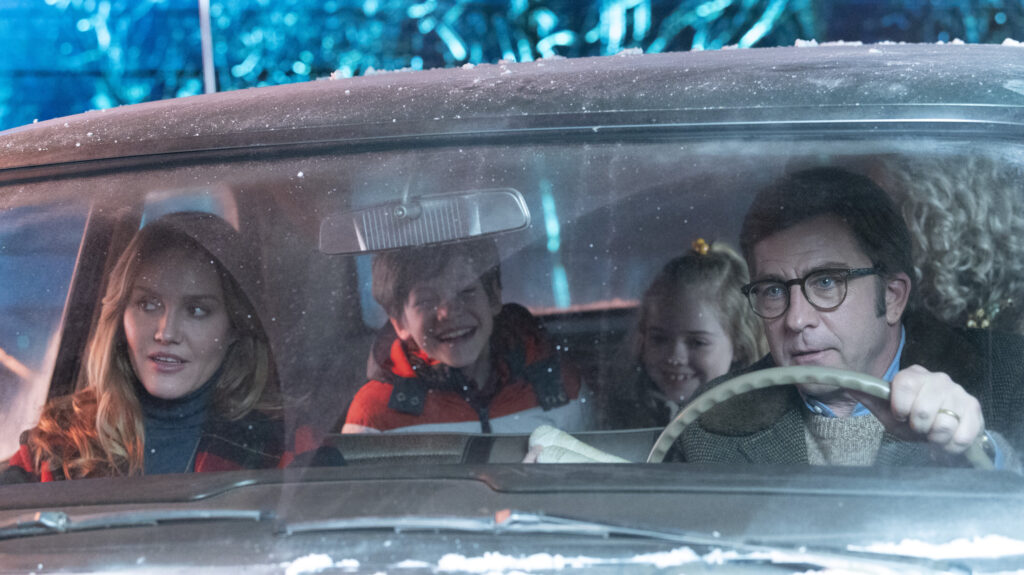
As I’ve said before, every hit movie that has ever been made is the equivalent of lightning in a bottle. It’s this special thing that happens where everything magically comes together in just the right way at just the right time. No matter how hard Hollywood tries to replicate this lightning, it never works. And that’s because you can’t recreate magic!
Let me give you an example of how hard it is to replicate a great movie. I remember M. Night talking about directing Bryce Dallas Howard in Lady in the Water. Night had directed Howard a few years earlier in the hit movie, The Village. And he talked about how, in between those two movies, Howard had grown up. Whereas, before, she was utterly committed to anything the director asked, this time, she was much more closed off and acting on her terms only. As such, she didn’t give nearly as good of a performance.
That’s the kind of thing that can ruin a movie. And it’s just ONE SINGLE VARIABLE within thousands that you have no control over. The operating modus in Hollywood is to get movies made. That alone is an impossible thing to do. When a few of those movies actually turn out to be good? That’s the miracle. Because, again, you have so little control over everything that, odds are, the movie’s not going to turn out the way you hoped.
A Christmas Story is one of the clearest examples of this. It was a bit of a weird movie that came out of nowhere. But something about the film undeniably worked. It captured the holiday through the eyes of children better than, probably, any movie in history.
Star Peter Billingsly seems to be aware of my Lightning in a Bottle theory as he’s resisted a sequel for years. It was only his good friend, Vince Vaughn, who finally convinced him to do it. I’m sad to say, though, that Billingsly was right and Vaughn was wrong.
The movie made a pretty bold creative choice early on that put it behind the eight ball. The first movie was about seeing Christmas through the eyes of a child. The new film was about seeing Christmas through the eyes of an adult. And, because of this, the movie couldn’t match the charm the first film had. You can’t make something as charming when it’s a hardened 40 year old analyzing it as opposed to an innocent 10 year old.
My dad, who loves the original Christmas Story, gave up on the new film about halfway through. There’s this scene where Ralphie’s friend challenges his other friend to a sled run down a manufactured toboggan structure. So everybody goes out to watch the friend sled down this enormous wooden contraption that didn’t even have a bottom. The bottom was nothing. So, once you got to the bottom, you would shoot off into the air and then fall another 50 feet to the ground.
And my dad said, “This isn’t real. The thing about the first one was everything was real. Nobody would actually sled down this thing because they’d probably die.” And he was right. It was a zany unrealistic situation that wouldn’t have made it into the first film. It violated that authenticity that made the original work. So, this one was a no-go for me.
The number 2 movie on the list is Spirited!
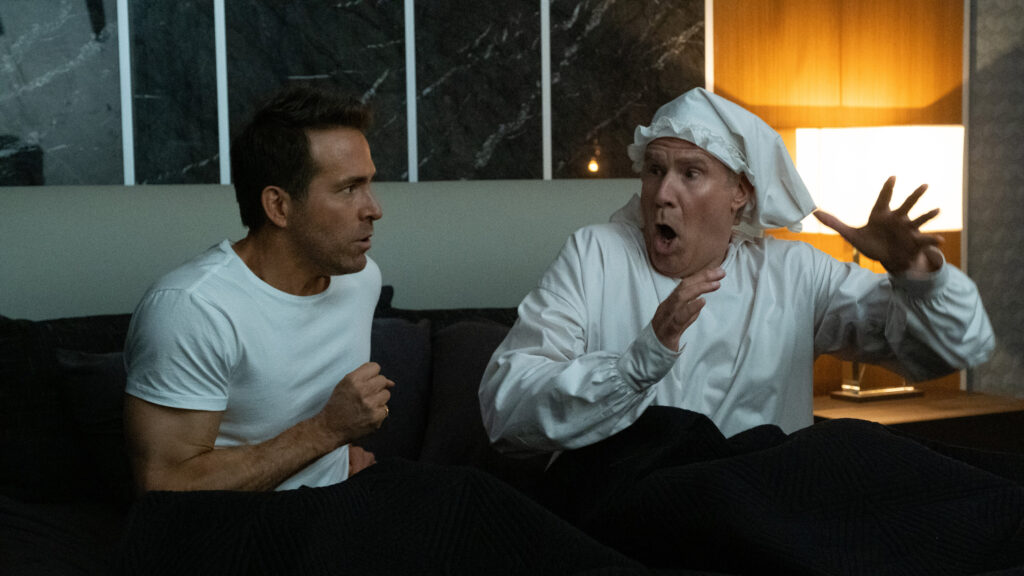
I was really looking forward to this movie. Ferrel and Reynolds working together felt like a no-brainer. And the movie definitely has its moments, more so than A Christmas Story Christmas. But the discussion of whether the film works is much more involved and nuanced.
Spirited does something I tell everyone on this site to do. Which is to find a fresh way into your story. Spirited does that in spades. They take the classic Charles Dickens story and ask the question, what if we told the story through the point-of-view of one of the ghosts as opposed to Scrooge?
As a screenwriter, I love this idea. IN THEORY. A change of POV is a smart way to find a fresh angle. But what you have to understand is that, with great stories, there’s a reason why they work so well. There’s a reason why telling this story from Scrooge’s point of view is so important to it working. When you upset that carefully constructed balance, you are sailing into uncharted waters. And that’s definitely how Spirited played out. It was like, “Okay, we’re going in this direction. I’m not quite sure how to handle it but I guess we’ll figure it out along the way!”
(Spoiler) And they make some fun choices. As it turns out, Will Ferrel’s ghost character is Scrooge! But he needs to be saved a second time. Again, as a screenwriter, I love this choice. You flip everything on its head. The student is helping the teacher rather than the teacher helping the student. It’s as fresh as fresh can be.
But when you’re trying to make a story work with a totally different set of variables than how it usually works, it’s a bit like driving a car backwards on the interstate. The car is still moving. But the chances of crashing and burning go up exponentially. Personally, I felt this movie was trying so hard to be different that it never found its groove.
So, while I probably wouldn’t recommend it, I don’t think you’re wasting your time if you pop it in between now and Christmas. It’s hard not to enjoy Ferrel and Reynolds in anything. And the movie has a genuine earnestness, whereas A Christmas Story Christmas never got there. So, if you’re choosing between the two, definitely go with Spirited. It’s got the best production value of a Christmas movie this year.
And our number one Christmas movie is…… little drummer boy roll please… Guardians of the Galaxy Holiday Special!
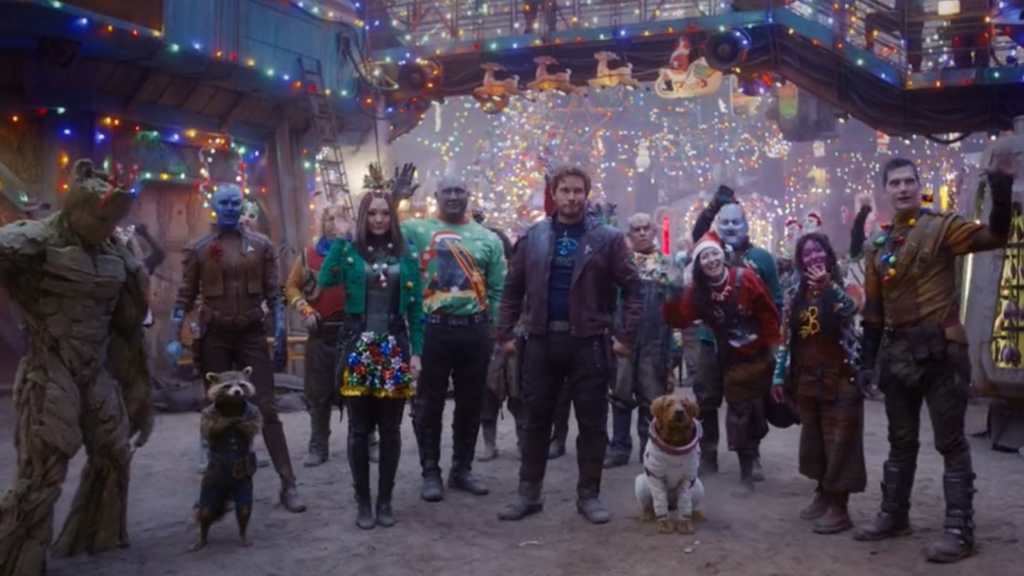
This is one of those times where I wish I didn’t follow the movie industry as closely as I do. Because when you do, you know certain things about projects that you wish you didn’t know. For example, you know that James Gunn wrote this script in less than three hours. You know that they filmed this movie between takes during Guardians of the Galaxy 3. Those things were percolating through my head the whole time I watched the mini-feature.
Cause I’m going to be honest. This *felt* like it was written in a few hours. And it truly felt like they had three locations and everyone was sort of tired and reluctantly standing around in each take.
Now, does that mean I didn’t like it? No!
I did like it!
And that’s mainly because the premise was so fun. Kevin Bacon was Peter Quill’s favorite actor when he grew up as a kid in the 80s on earth. So teammates Drax and Mantis travel to earth to kidnap Kevin Bacon so they can give him to Peter as a Christmas present. That idea beats out the ideas of A Christmas Story and Spirited easily.
Also, James Gunn is just funnier than the writers working on those two films. We eventually find out that Peter told his Guardians teammates about Kevin Bacon AS IF HE WAS A REAL PERSON rather than being a movie star. So Drax and Mantis think that Kevin Bacon really did save a town by dancing. They think he really did help kill a bunch of giant killer worms under the desert. When they find out he’s just an actor, they’re furious.
Also, what I didn’t know was, which this special made clear, that Peter Quill saving the universe at the end of the first movie by dancing was done because Kevin Bacon was his hero and Kevin Bacon saved the day by dancing in Footloose. So it was fun to learn Peter’s inspiration for that climactic moment.
I also liked that they created a brand new soundtrack for the film – creating new Christmas songs. At least I’d never heard these songs before so feel free to correct me if I’m wrong.
I wish Peter Quill had a little more to do than just stand around and look either bummed or excited. I wish there were more than three locations. But if you’re looking for a movie to get you in the Christmas mood and do so in an original fashion, it’s the Guardians Holiday Special all the way, baby. This is what I would pick over literally, every holiday movie on streaming right now.
Which one was your favorite?
Remember the days when we used to get up at 4am and drive our car through the rain and the slush to wait in line at the Best Buy to get that once-in-a-lifetime $99 55-inch widescreen television deal, only to find out when we got inside, it was too late, all the $99 dollar TV deals had been sold? Even as you explained to them that this couldn’t possibly be true since you were the seventh person in the store, they insisted. And then you thought, wait a minute, they didn’t just LIE about that deal to get me here, did they? They didn’t create a false deal just to lure me into the store and then, when I found out there wasn’t a deal, I’d figure I was here anyways so I might as well buy other stuff. No, a giant brand name store would never do such a thing to its customers.
As much as I loved those days, today’s deal at Scriptshadow IS NOT THAT. That’s because I’m offering the most awesome of awesomest deals you can imagine. Four pages of notes on a feature screenplay for just $199. If my regular rate has been too much in the past, NOW IS THE TIME to take advantage of a Scriptshadow Consultation. I can’t give a lot of these away so I’m only offering this to the first five people who claim the deal. Just e-mail me at Carsonreeves1@gmail.com with the subject line BLACK FRIDAY DEAL. This works for both features and pilots. You don’t need to have the script ready today but you do have to pay now to secure the deal. Hurry up! These will go fast!
REMINDER: HIGH CONCEPT SHOWDOWN – FIVE DAYS LEFT!
Got a high-concept script? Enter it into the High Concept Showdown! More info here…
What: High Concept Showdown
Deadline: Dec 1, 2022 (Thursday) by 8pm Pacific Time
Include: Title, Genre, Logline, and a PDF of your screenplay
Additional: Also, feel free to pitch, more extensively, why your script deserves to be featured. Sometimes this is the difference between people checking out and not checking out your script. Think of this as your “elevator pitch.” You’ve got the producer in the elevator for a minute. Explain to him why he needs to read your script.
Where: E-mail all entries to carsonreeves3@gmail.com
Cost: Free
Also, the newsletter should be showing up in your Inboxes in a few days! I tackle one of the most controversial subjects ever in it. Should you drink when you write! :)
********
8 DAYS LEFT TO HIGH CONCEPT SHOWDOWN!
SUBMISSION DETAILS HERE!
********
Genre: Family
Premise: When a bully’s antics land a nerdy boy in the bottom of a well, his self-proclaimed psychic friend and unaware crush team up to find him.
About: This script is based on a book that won the Newbery Medal, which is awarded to the author of the most distinguished contribution to American literature for children. It also finished on last year’s Black List with eight votes. They got a pretty big writer to adapt the book. Michael Golamco wrote the surprise Netflix hit, “Always Be My Maybe.” He has also written a draft of the perpetually-in-development, “Akira.” Forrest Whitaker will produce. Netflix will make the film.
Writer: Michael Golamco (based on the novel by Erin Entrada Kelly)
Details: 93 pages
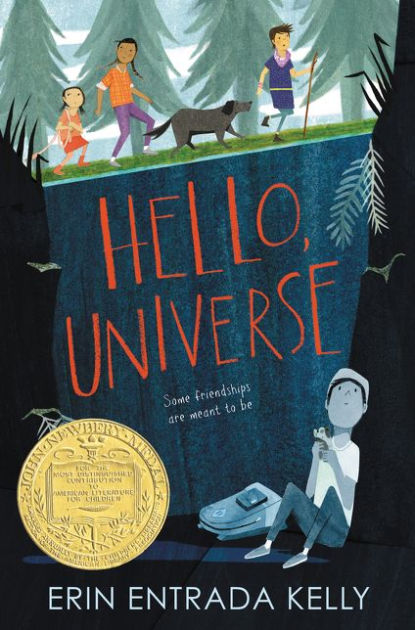
Since all of you are CRAZY for not loving White Lotus as much as I do, it was important, heading into Thanksgiving, that I review a feel-good screenplay that all of us could celebrate together – something so warm and invigorating, we wouldn’t even need alcohol to deal with our families.
Speaking of Thanksgiving, I think a food revolution needs to take place over the holiday. Who’s with me!?
The whole full-turkey-on-the-table thing is played out! I, for one, want to begin a new tradition of turkey pizza. The dish’s execution is simple. You make a pizza, you cut out a lot of little bite-sized pieces of turkey, and then you don’t allow that turkey anywhere near the pizza. Feed it to your pets. Then find some sausage and add that to the pizza. As well as some pepperoni. In fact, just call your local pizza joint and they can speed this whole operation up for you. That’s MY Thanksgiving food suggestion.
Okay, let’s check out this uplifting story about a kid who gets pushed into a well!
11 year old Filipino middle-schooler, Virgil, is a level 17 dork. His dorkiness is embedded so deeply within him, that even his family has given up hope that he can be anything less than a level 9 dork.
But Virgil can’t worry about his dorkiness because it’s the end of school and the last chance – THE FINAL CHANCE – before summer for him to talk to Valencia Sommerset, the girl of his dreams. Valencia is a bit of an outcast herself due to being deaf.
When Virgil fails to speak to Valencia, he trudges home and shares the news with his best friend, Kaori Tanaka, a 12 year old self-proclaimed psychic who lives next door. Kaori and her plucky 7 year old sister, Gen, try to cheer Virgil up but nothing works.
Kaori tries to get Virgil’s mind off Valencia by having him head into the woods to look for some special rocks she needs for her new psychic business. But, along the way, he runs into the school bully, who throws his backpack in a well. Virgil’s guinea pig, Gulliver, was inside, so he climbs down to save him, but ends up getting trapped at the bottom.
Ironically, Kaori’s first psychic customer is Valencia, something she’s unaware of since Valencia uses an alias. Valencia needs help interpreting a recurring nightmare. Around this time, Kaori realizes Virgil is missing and recruits Valencia to help her find him. So the three girls head out into the woods in search of the friend, who ponders the possibility that he may meet his demise down here.
 Thanksgiving at the Carson household.
Thanksgiving at the Carson household.
Hello Universe gets the first part of its central character construction correct. Virgil is in love with a girl who will never love him back. He lacks courage. His family thinks he’s lame. He’s a nerd. He’s picked on by the bully.
In other words, the writer uses a “Life treats our hero cruelly” technique to elicit sympathy from the reader.
However, the writer doesn’t get the second part of the “likable” equation right for these types of characters. Virgil is a downer. He’s negative. Audiences like characters who are dealt a bad hand AS LONG AS THEY STAY POSITIVE ABOUT IT. We just talked about this in “The Maid,” the character that’s going to win Florence Pugh an Oscar.
That character was autistic. She recently lost her best friend. People took advantage of her all the time. But amongst all of it, she stays tirelessly optimistic. And that’s when we love a character. The person who keeps getting up after being knocked down is one of the most powerful likability tools there is in character construction.
That’s not to say Virgil is a bust. We still root for the guy. But Virgil ends up being the fourth most impactful character in the story, behind the three girls looking for him.
As for the story itself, I always get a little nervous about stories that could’ve been written 75 years ago without changing a word. True, some stories are timeless. But this is usually an indication that the writer isn’t bringing anything new to the table.
With that said, if you can get the emotion and the relationships right, you can write a story that works in any time period. And I would probably include “Hello Universe” in that category.
The thing that ultimately pulled me in was the dramatic irony created with Valencia’s inclusion on the rescue team. We know that Valencia is Virgil’s crush but the girls think she’s someone else because she lied about her name. I found that to be kinda fun, that they’ve known about Virgil’s love for this girl for years yet have no idea that she’s helping them find him.
There’s also a sweetness to the journey and to the friendships that make you all warm and fuzzy inside, like a glass of warm apple cider. When you write these younger-skewing stories, you want to explore universal themes and the things that would seem high-stakes to a 12 year old, which are totally different from those of a 32 year old. There doesn’t have to be the threat of the world ending in these stories. Just things that 12 year olds think of as the world ending. Like being trapped in the middle of a forest with the school bully. Or the fear of never fitting in, which is what both Valencia and Virgil are going through.
I just wish there was a little more creativity in the script. One thing I’m always looking for in screenplays – especially ones that play in familiar sandboxes – is unique moments – moments that could only happen in your particular script. Cause if you don’t have those, what’s the point? Why write something that only retreads other films?
Look at every single variable of your screenplay – your plot, your characters, your setting – and figure out combinations of those variables that can you an original moment here, or an original moment there.
I’ll give you the one example I saw in Hello Universe. Soon after Virgil gets stuck in the well, Valencia is, coincidentally, walking by. Virgil doesn’t know it’s her. But he hears somebody. So he starts screaming for help. But… guess what? She can’t hear him because she’s deaf.
It’s this ironic moment that could’ve only happened under these particular set of variables that makes the scene pop.
Hello Universe needed more moments like that to separate itself. With that said, it’s a heartwarming tale that seems perfectly suited for a Thanksgiving weekend read. Of course, that read should be happening while snarfing down several pieces of my new Thanksgiving Turkey Pizza Without Turkey. Feel free to e-mail me and I will send you the recipe.
Script Link: Hello Universe
[ ] What the hell did I just read?
[ ] wasn’t for me
[x] worth the read
[ ] impressive
[ ] genius
What I learned: A common thing I’ve been seeing in scripts lately is hitting the emotional beat so hard that it actually creates the opposite effect. Writers do it cause they can’t help themselves. They NEEEEEEED you to feel that emotion. Here’s an example. It’s the moment after (spoiler) the girls save Virgil.

By underlining “vulnerable,” and hitting it so hard, it actually draws attention to the fact that you want the reader to feel emotion. Don’t do this! Trust the emotion. Trust the moment. It will do the job for you. All you need to do in this instance is eliminate the underlining of “vulnerable” and it will work swimmingly. No need to go over the top.


